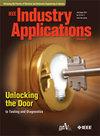Design Criteria of Non-Isolated Bidirectional DC-DC Converters: A Review
IF 4.5
2区 工程技术
Q2 ENGINEERING, ELECTRICAL & ELECTRONIC
引用次数: 0
Abstract
Battery energy storage systems are widely used for renewable power generation and electric transportation systems. Bidirectional DC-DC converters (BDCs) are key components in such systems, enabling bidirectional power flow in battery charging and discharging modes. BDCs can be categorized into isolated and non-isolated. Non-isolated BDCs have lower volume, weight, and power losses, suitable for compact structures without needing galvanic isolation. In this paper, a comprehensive literature review is conducted for non-isolated BDCs, covering soft switching, current ripple reduction, high voltage gain and resiliency techniques. Soft switching aims to reduce switching losses and improve efficiency, including auxiliary circuits and non-auxiliary methods, such as interleaved structures, phase-shift modulation, and synchronous rectification. Current ripple reduction focuses on capacitive loop configurations, interleaved structures, and coupled inductor-based methods. Batteries are low-voltage power sources, BDCs can increase the output voltage to a level required by the applications through an appropriate voltage gain, and high voltage gain techniques include capacitor-based, magnetic-based, and combined networks, and mixed structures. Resiliency is explored to ensure reliable operations under adverse conditions. This review provides valuable insights into developing more efficient, reliable, and high-performance BDCs, addressing the evolving demands of modern energy systems. Future research directions in non-isolated BDCs are recommended in this paper.非隔离双向DC-DC变换器的设计准则:综述
电池储能系统广泛应用于可再生能源发电和电力运输系统。双向DC-DC转换器(bdc)是该系统的关键部件,可实现电池充电和放电模式下的双向功率流。bdc可分为隔离型和非隔离型。非隔离式bdc具有更小的体积、重量和功率损耗,适用于紧凑的结构而不需要电隔离。本文对非隔离式bdc进行了全面的文献综述,包括软开关、电流纹波减小、高电压增益和弹性技术。软开关以降低开关损耗和提高效率为目的,包括辅助电路和非辅助方法,如交错结构、相移调制、同步整流等。电流纹波的减少主要集中在电容回路配置、交错结构和基于耦合电感的方法上。电池是低压电源,bdc可以通过适当的电压增益将输出电压提高到应用所需的水平,而高电压增益技术包括基于电容的、基于磁性的、组合网络和混合结构。探索弹性,以确保在不利条件下可靠运行。这篇综述为开发更高效、可靠和高性能的bdc,满足现代能源系统不断变化的需求提供了有价值的见解。最后,对非分离bdc的未来研究方向进行了展望。
本文章由计算机程序翻译,如有差异,请以英文原文为准。
求助全文
约1分钟内获得全文
求助全文
来源期刊

IEEE Transactions on Industry Applications
工程技术-工程:电子与电气
CiteScore
9.90
自引率
9.10%
发文量
747
审稿时长
3.3 months
期刊介绍:
The scope of the IEEE Transactions on Industry Applications includes all scope items of the IEEE Industry Applications Society, that is, the advancement of the theory and practice of electrical and electronic engineering in the development, design, manufacture, and application of electrical systems, apparatus, devices, and controls to the processes and equipment of industry and commerce; the promotion of safe, reliable, and economic installations; industry leadership in energy conservation and environmental, health, and safety issues; the creation of voluntary engineering standards and recommended practices; and the professional development of its membership.
 求助内容:
求助内容: 应助结果提醒方式:
应助结果提醒方式:


